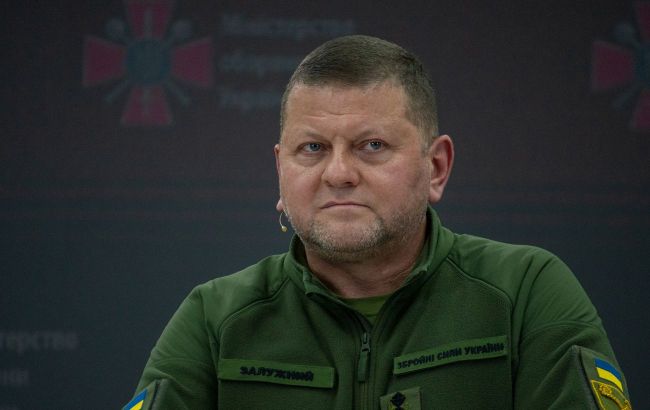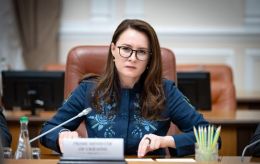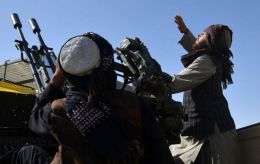Zaluzhnyi's briefing highlights: Maryinka frontline situation, demobilization, and electronic call-up
 Commander-in-Chief of the Armed Forces of Ukraine, Valerii Zaluzhnyi (Photo: Getty Images)
Commander-in-Chief of the Armed Forces of Ukraine, Valerii Zaluzhnyi (Photo: Getty Images)
Commander-in-Chief of the Armed Forces of Ukraine, Valerii Zaluzhnyi, held a briefing for journalists in Kyiv, addressing matters concerning military demobilization, the work of the Territorial Recruitment Centers (TRC), electronic summons, and more.
RBC-Ukraine gathered the main statements made by the Chief of of the Armed Forces of Ukraine during the briefing.
Article preparation involved material from the We are Ukraine channel and the media outlets Hromadske, Radio Liberty, and ArmyInform.
About demobilization and rotation
According to Zaluzhnyi, the General Staff agreed with the Ministry of Defense on demobilizing military personnel after 36 months of service. However, as the Commander-in-Chief has added, the possibility of demobilization will depend on several factors.
The first factor is that there should be no escalations on the front line. The second is the availability of replacements for these individuals after 36 months.
"I clearly understand that our soldiers are currently doing their duty in extremely challenging and difficult conditions on the front, thanks to which we can communicate calmly now. Of course, I would like those who join the army, especially those who are already serving, to clearly understand how long they will need to fight," says the Chief.
Zaluzhnyi also comments on the possibility of rotations on the front every six months, as envisaged in the bill amending mobilization, which the Cabinet introduced to parliament yesterday.
"We would like this norm to be in place. But the situation depends on the actions of the enemy. We cannot predict whether it will be five or six months. What if the enemy attacks previously calm areas?" he explains.
Electronic summons
According to the Chief, he would welcome any method of involving people in the military but adds that this initiative did not originate from the General Staff or the Armed Forces of Ukraine.
"The General Staff did not make any proposals regarding electronic summons. But we welcome any method that will meet our need for personnel," says Zaluzhnyi.
Work of the Territorial Recruitment and Social Support Centres (TRCs and SSCs)
Zaluzhnyi is dissatisfied with the work of the Territorial Recruitment and Social Support Centres (known as military recruitment offices).
"As of today, I'm not satisfied with their work. We have monitored to ensure that key positions remain and work continues. Regarding the heads of these centers, some have already been dismissed, but the process of change is ongoing," he emphasizes.
According to the Chief, if the recruitment offices worked as needed, there would be no need to discuss a bill on mobilization.
"The people working in these centers require specific expertise, knowledge, skills, and abilities to fulfill their duties. Both externally and internally, in these structures. But as of today, I want to say that the ability to receive personnel in the territorial recruitment centers has not been lost," adds Zaluzhnyi.
Maryinka and Avdiivka
Zaluzhnyi has discussed the situation in Avdiivka and Maryinka, currently the hottest points on the front line. He has informed that Ukrainian servicemen retreated to the northern outskirts of Maryinka since the Russians completely destroyed the Ukrainian city.
"We defend every inch of our land. But when enemy shells start to dig into this tiny piece of land along with stones, earth, and our fighters – the lives of our soldiers are more important to us. Therefore, in Maryinka, which held on for almost two years, our forces are still located in its northern part, but they have prepared a defensive line beyond this settlement," the Chief states.
Commenting on the situation in Avdiivka, which occupiers are attempting to surround, similar to what happened in Bakhmut, Zaluzhnyi urges not to "fixate or create any "show or sorrow" around a specific settlement. However, he has added that the Russians can gather their forces in a certain direction and repeat the fate of Bakhmut in two to three months.
"Our actions are governed by their own laws, unaffected by whether it pleases deputies or journalists...Every piece of land is valuable to us; we'll defend as much as we can. If we lack strength, we preserve our people, and then we'll regain," Zaluzhnyi declares.
War in 2024 should differ from 2023
According to Zaluzhnyi, the war in 2024 should differ from the one in 2023.
"The year 2024 should differ from 2023 because otherwise, what I wrote about in the article (The Economist article - Ed.) awaits us. We have identified problems and found 90% of the solutions to act more effectively and preserve lives. Our partners have agreed with us. My main mistake was - that I thought that the level of losses we inflicted would deter anyone. But not Russia," the Chief notes.
Preparation of brigades in the Armed Forces of Ukraine
Zaluzhnyi states that Ukraine currently has the capacity to simultaneously train up to 10 brigades. He also has agreed that only well-prepared individuals should go to the front lines.
"I agree with any initiatives that increase the responsibility for sending unprepared people to the front. This cannot happen. We have an excellent opportunity to use both our capabilities and those of our partners - and they pay great attention to the training of our troops," the Chief adds.
Regarding conscripts
Zaluzhnyi supports the release of conscripts who weren't demobilized due to martial law.
"In the summer, we weren't ready to release conscripts. But by the end of November, it was our proposal – we appealed to the Ministry of Defense to release conscripts from military service. Our clear position is to release them so that they can go for a rest. Then, further actions are taken within the framework of the existing legislation," he says.
Previous statements by Zaluzhnyi
It's the second appearance of Zaluzhnyi in public today. Before the briefing, he appeared on the United News telethon and commented on the bill on changes in mobilization introduced to the parliament yesterday.
"My main concern is for people to join the army and be able to perform the tasks set for them. Who will have a deferment or who won't, whom the state will call up - today I believe it's not within my competence," he said then.
Additionally, Zaluzhnyi reacted to President Volodymyr Zelenskyy's statement about the need to mobilize an additional 500,000 people. According to the Chief, the General Staff has not specified a specific figure but regularly formulates requests for ammunition, weapons, and accordingly, human resources.
Changes in mobilization
During the final press conference, Zelenskyy mentioned that the General Staff requested the mobilization of an additional 450-500 thousand individuals. According to him, this requires a comprehensive plan that also addresses the issues of those who have been continuously fighting for almost two years without a break.
The Cabinet of Ministers recently submitted a substantial bill on mobilization to the Parliament. It proposes lowering the age limit from 27 to 25, reducing the list of categories exempt from mobilization, sending summons to territorial recruitment centers via email, and other initiatives.
Read more in the article "New rules: Brief overview of comprehensive draft law on mobilization."

